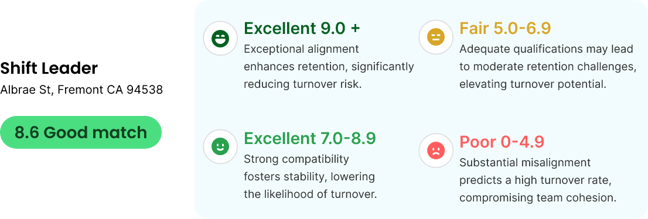Understanding Sprockets Scoring Reports

At Sprockets, we employ a unique scoring system to help you make informed hiring decisions. Each applicant is assigned a score from one to 10, based on their alignment with the personality traits of your top performers. These scores are color-coded to provide a quick visual assessment.
Sprockets Score Categories:
- Excellent Match: Exceptional alignment enhances retention, significantly reducing turnover risk.
- Good Match: Strong compatibility fosters stability, lowering the likelihood of turnover.
- Fair Match: Adequate qualifications may lead to moderate retention challenges, elevating turnover potential.
- Poor Match: Substantial misalignment predicts a high turnover rate, compromising team cohesion.
Overview of Traits:
Personality:
| Trait | Description |
|---|---|
| Extraverted | Measures the degree to which a person feels energized when interacting with others. |
| Active | Measures the degree to which a person has a need for activity and engagement in their life. |
| Assertive | Measures the degree to which a person is assertive and comfortable expressing their ideas. |
| Cheerful | Measures the degree to which a person is happy and cheerful. |
| More Energetic | Measures the degree to which a person has energy and enthusiasm. |
| Friendly | Measures the degree to which a person is friendly and positive when interacting with others. |
| Adventurous | Measures the degree to which a person enjoys and seeks out adventure. |
| Artistic | Measures the degree to which a person appreciates and enjoys the arts. |
| Imaginative | Measures the degree to which a person is imaginative. |
| Intellectual | Measures the degree to which a person is inclined toward intellectual or academic learning. |
| Conscientious | Examines the degree to which a person is reliable, organized, disciplined, and deliberate. |
| Ambitious | Measures the degree to which a person is ambitious and driven by the desire for achievement. |
| Cautious | Measures the degree to which a person is cautious. |
| Disciplined | Measures the degree to which a person is prone to following routines and rules. |
| Dutiful | Measures the degree to which a person respects expectations or authority. |
| Organized | Measures the degree to which a person is organized and orderly. |
| Self-Assured | Measures the degree to which a person is confident in themselves. |
| Agreeable | Examines the degree to which a person is inclined to please others. |
| Cooperative | Measures the degree to which a person takes into account the needs of others. |
| Empathetic | Measures the degree to which a person internalizes the feelings of others. |
| Generous | Measures the degree to which a person enjoys spending time and money on others. |
| Humble | Measures the degree to which a person is humble and modest. |
| Trusting | Measures the degree to which a person trusts people easily. |
Needs:
| Trait | Description |
|---|---|
| Challenge | The tendency towards overcoming obstacles and achieving difficult things. |
| Closeness | The need or prioritization of intimate and affectionate bonds with loved ones. |
| Learning | The need or prioritization of exploring new concepts, whether personally or in society. |
| Excitement | The need for energetic activity in life, whether physical, social, or mental, often avoiding downtime. |
| Harmony | The need for peace and agreement among those around a person, including conflict management skills. |
| Perfection | The pursuit of a utopian or idealistic reality, even if it seems out of reach, persisting toward it. |
| Freedom | Valuing freedom above all else, sometimes at the expense of safety or equality. |
| Connection | Highly valuing affection, particularly romantic affection. |
| Utility | Making decisions based on logic and practicality, choosing the most pragmatic option. |
| Self Expression | Enjoying discovering and asserting one's identity, sexuality, artistry, and creativity. |
| Stability | Prioritizing comfort from reliable sources, often resisting destabilizing changes. |
| Structure | Appreciating a methodical, careful, and logical approach to tasks, not prone to spontaneity or errors. |
Focus
| Trait | Description |
|---|---|
| Inward | The degree to which a person's language is self-focused. |
| Outward | The degree to which a person is focused on others rather than themselves. |
| Reasoning | Reflects structured, hierarchical thinking, complex problem solving, and higher order executive functioning. |
| Understanding | A measure of automatic cognitive processes involved with paying attention and processing environmental inputs and the world around us. |
| Responsibility | The degree to which a person is engaged in causal thinking, understanding the relationship between a cause and its effect. |
| Discrepancies | The degree to which a person is comparing or articulating differences between a current state and an alternative state, often related to expressions of inferiority, desires, or expectations. |
| Insights | The degree to which a person is focused on gaining understanding, insight, or clarity into themselves, someone else, or an entity. |
| Past | The degree to which a person is focused on the past. |
| Present | The degree to which a person is focused on the present. |
| Future | The degree to which a person is focused on the future. |
Drives
| Trait | Description |
|---|---|
| Affiliation | The degree to which a person is driven by their own internal need for affiliation with other individuals or groups. |
| Achievement | The degree to which a person is driven by an internal need for achievement. |
| Risk-Seeking | The degree to which a person is focused on engaging in risky behaviors or activities. |
| Risk-Aversion | The degree to which a person is focused on avoiding risk. |
| Power | The degree to which a person is driven by an internal need for power or domination. |
| Reward | The degree to which a person is driven by an internal need for reward. |
In addition to the Match Score, we provide you with actionable suggestions on how to proceed with each applicant. This simplifies decision-making with one-click actions, streamlining your hiring process.


For more information on Scores, view this article here.